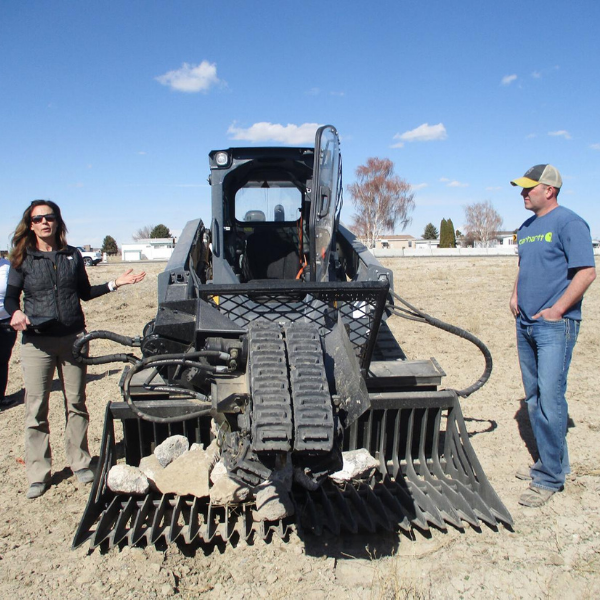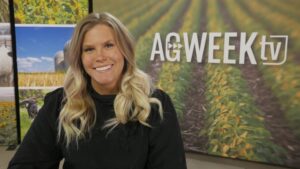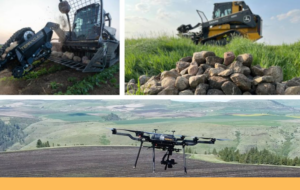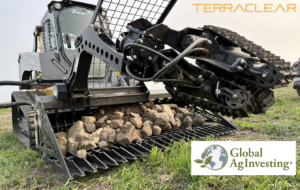Capital Press – “Rock-Picking Robot: First maps, then full automation will do worst job on any farm”
TWIN FALLS, Idaho — Brent Frei grew up on a dryland wheat farm on the Camas Prairie of northern Idaho. And like every farm kid, he picked his share of rocks without giving much thought to the age-old, perennial chore.
It is one of the worst jobs on any farm.
Now, after a successful career in high-tech, he has turned his attention to that chore, starting a company that uses high-flying drones and robotics to locate and pick up the rocks that can damage farm implements.
High-tech career
After graduating from Grangeville, Idaho, High School in 1984, Frei set out for Dartmouth College in New Hampshire. He earned a bachelor’s degree in mechanical engineering in 1989.
From there, he went to work for Motorola, where he learned software development and designed batteries for cellular phones. He moved to Microsoft in Bellevue, Wash., where he built customer data systems.
Along the way, he founded two software companies, Onyx Software and Smartsheet, which he took from inception to initial public offering.
He also founded Harvest West Investments, a farmland investment fund that owns and manages farms in Washington, Oregon and Idaho.
Frei left his executive role at Smartsheet in 2016 but remains on its board of directors. That gave him more time to return home and help out on the family farm, which has grown to 6,000 acres.
And that’s where he was — in the heat, picking rock by hand with his 81-year-old dad — when the absurdity of the manual task hit him.
“I thought, why isn’t this automated?” he said. “Everything is automated.”
He was a successful businessman who knew a lot about software, robotics and artificial intelligence, but he was still picking rock by hand all day in the hot sun. And he couldn’t understand why technology hadn’t been applied to the worst, most boring job on the farm.
“Why has this not been solved?” he said.
He realized all the pieces for a solution existed. Someone just needed to put them together.
“When I see something, a problem that has never been solved, it motivates me to solve it,” he said.
That led to collaboration and discussions with former partners, colleagues and acquaintances.
The result was Frei’s fourth company, TerraClear, which is focused on designing a fully automated rock picker. The company officially launched in December 2017.
The goal was to design a rock-picking tool that can be operated by anyone, Frei said.
Research and development has taken 3 years and $10 million, and the company has received a lot of input from farmers.
First, the system uses a drone to determine the size and location of every rock on a field. That information is mapped and the most efficient path for picking up the rocks is plotted.
The picker attachment hooks onto a skid steer and the driver follows the path on the map to pick the rocks.
The system works under any field conditions, such as stubble, pasture or residue.
“This thing can just pick the rock and leave everything alone,” Frei said.
Rock and roll
“There are lots of other rock pickers out there,” said Heidi Lindsley, the company’s marketing director. “We believe ours has a unique niche.”
Some mechanical pickers only work in certain situations, such as heavily tilled soil, and a farmer still has to scout every inch of the field, she said.
“Ours is really intended to replace hand-picking and be able to focus in on selective rock picking,” she said.
It saves a lot of time and is more efficient, going directly to where the rocks are instead of combing the whole field, she said.
TerraClear’s picker has hydraulic controls to allow for back-and-forth, up-and-down movement of the picker and in-and-out movement of the rock paddles, she said.
On average, it can pick a full loader bucket of rocks every 8 to 15 minutes, but that will vary based on the density of the rocks and the distance between the rocks and the dumping location, she said.
The company put 12 rock-picking units in the hands of farmers this spring to get their feedback before going commercial this fall.
The company also provides an on-demand service that uses a drone to map the size and locations of rocks in a field. Then the farmer can follow the map the drone produces to more efficiently pick the rocks. The map shows the location and size of every rock 8 inches or larger.
TerraClear also offers a rock-picking service, a help to farmers with a short time window before seeding.
“We can whip in there and get their problem out for a few hundred bucks. The majority of people we’ve done it for want us back,” Frei said.
The next version of the picker will have a computer vision system mounted on the tractor, loader or skid steer. A driver will operate the vehicle, while the rock picker mechanically snags the rocks and puts them in the loader bucket. Prototypes are expected this fall.
The longer term vision is for a fully autonomous, independent piece of equipment. It’s still several years out, but it will be an operator-free vehicle with a picker, Lindsley said.
Rock solid
Most of the feedback from farmers has been positive. They have made suggestions, but farmers like the utility of it and the ability to pick a lot of rock in a short time, Frei said.
The company recently offered a demonstration of the picker for agriculture students at the College of Southern Idaho in Twin Falls, and several were jostling for a chance to operate it.
Frei is not surprised after seeing two workers on one farm fighting over who gets to use the picker.
“It will take rock picking from worst (chore) to first,” he said.
And agriculture is taking notice. TerraClear recently gained national attention as one of four finalists in the American Farm Bureau Federation’s 2021 Ag Innovation Challenge.
The focus now is getting the picker to full autonomy, where it picks and piles rocks of its own accord — “a Roomba for rock picking,” Frei said, comparing it to an autonomous vacuum cleaner. “…It’s pretty darn exciting.”
Frei anticipated the hard part of developing a rock-picking robot would be designing a tool that could pick all sizes of rock. He gives kudos to TerraClear’s design team, which has met that challenge.
“I’ve been really encouraged,” he said.
His previous companies were successful because of great people on the team, and the TerraClear group is “the best team yet,” he said.
The company has 23 employees, all stockholders, with offices and workshops in Bellevue, Wash., and Grangeville, Idaho. The team has deep experience in software, hardware, machine learning, product development, leadership and farming.
The company will continue to work on a solution for full automation in clearing rock, which would be a game-changer for agriculture — and a relief to farm kids.
“If we’ve done a good job, farmers will love it,” Frei said.



